Trump returns to Washington for 1st time since leaving office in insurrection's shadow
Meanwhile, the House panel investigating the Capitol mob vows more hearings.
Former President Donald Trump returned to Washington on Tuesday for the first time since leaving office in the shadow of the Capitol insurrection, delivering an often meandering and hyperbolic speech promoting tough-on-crime policies and touching on a slate of culture war issues.
Trump's appearance, at a two-day conference hosted by the America First Policy Institute, a MAGA-aligned group formed when he took office, comes as he publicly teases a 2024 presidential run -- and amid a congressional investigation into his actions surrounding the deadly rioting last year by his supporters at the Capitol, which led to his historic second impeachment. (He denies wrongdoing.)
The former president used his speech at the AFPI to again warn of the "American carnage" he invoked during his 2017 inauguration speech, casting the U.S. as a nation beset by out-of-control violence primarily fueled, in his telling, by lax policies in Democratic cities.
Trump pushed for "an all out effort to defeat violent crime" and said that law enforcement should "be tough and be nasty and be mean if we have to" and reimpose stop-and-frisk policies, which studies have shown are ineffective and often lead to racial profiling.
He went on to call for the implementation of the death penalty for drug dealers, saying executing each one would save "500 lives" and praising what he called the "two-hour trials" dealers get in China.
His comments mark something of a reversal from his policies in office, when he sought to take a tough stance against social justice protests but also signed into law the bipartisan First Step Act, which worked to shorten sentences for nonviolent drug offenders.
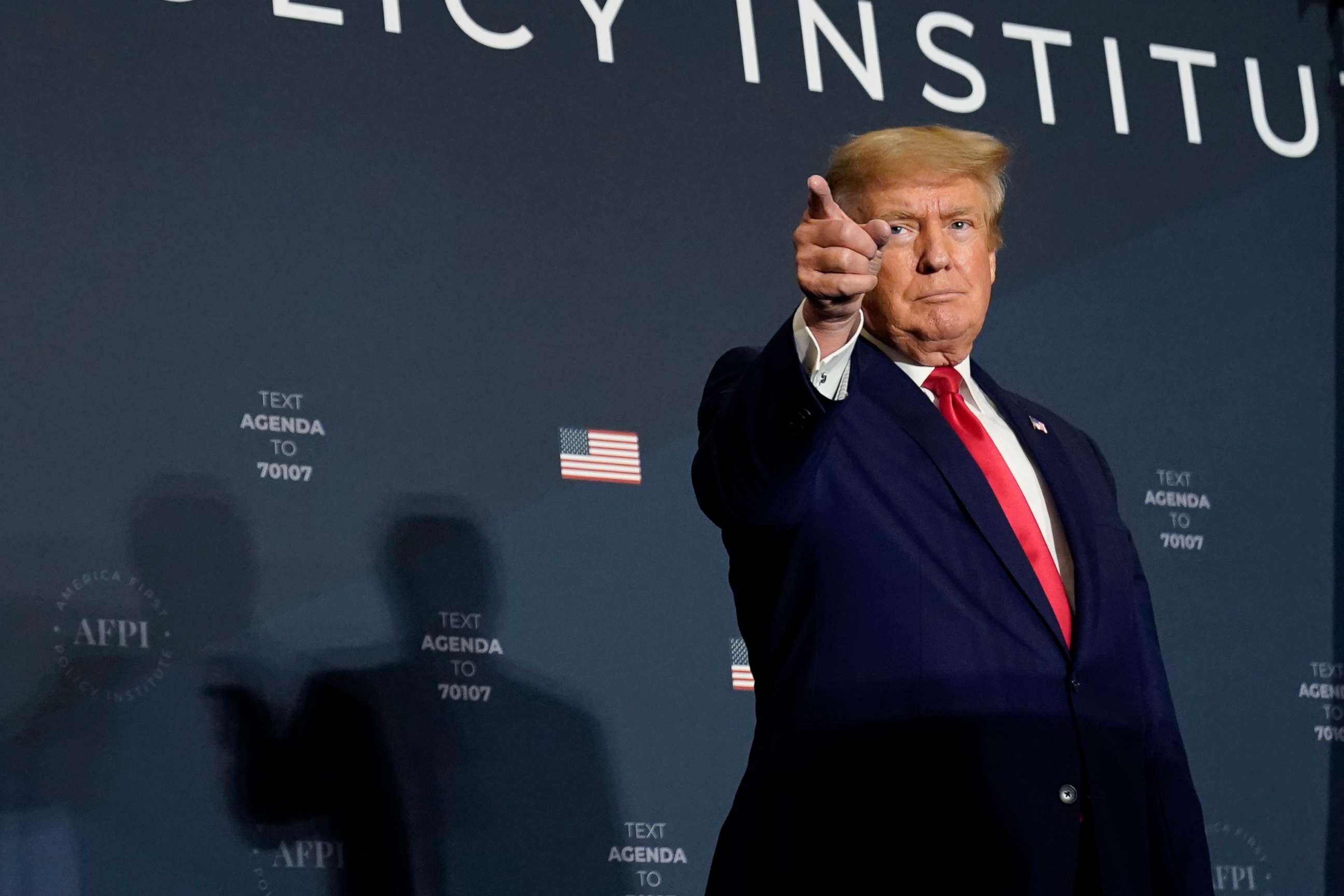
On Tuesday, after focusing largely on crime for much of the start of his speech, Trump launched into characteristic stream-of-consciousness that hit on several conservative-friendly issues, from transgender athletes to mail-in ballots to immigration.
In one instance, Trump pantomimed the struggles of a weightlifter competing against an unnamed trans athlete.
On immigration, he added: "Many of these people that are coming in will cause trouble for our country the likes of which we have no idea, terrorism and other things. They're sending in people into our country that will cause problems for us for decades to come and problems like perhaps you've never even seen before."
Trump also hammered the House committee investigating the Jan. 6, 2021, riot on Capitol Hill. The panel's last hearing focused on the former president's inaction as the insurrection took place.
"Something's going to have to happen, because people will not take it much longer. There's two sets of justice, and we don't have to go into it -- but nobody has ever seen what's happening today in our country," he said.
Still, Trump refrained from criticizing his former Vice President Mike Pence, who swiped at Trump's "focus" on the past in remarks at a separate event earlier Tuesday.
In the lead-up to his appearance, some other Republicans weighed in on Trump's planned speech.
Trump's former White House trade adviser Peter Navarro shared a message for the former president: "Don't Go."
In an op-ed for American Greatness on the eve of Trump's return, Navarro urged him not to deliver a speech to the group, claiming that the institute was trying to "hijack the political attractiveness of Trumpism but replace Trump with an AFPI-anointed RINO ["Republican In Name Only"]."
That appeal came as the Republican Party faces an ongoing identity crisis, exemplified by Pence's separate speech on Tuesday -- with a split between those who back Trump's style and those who break from them.
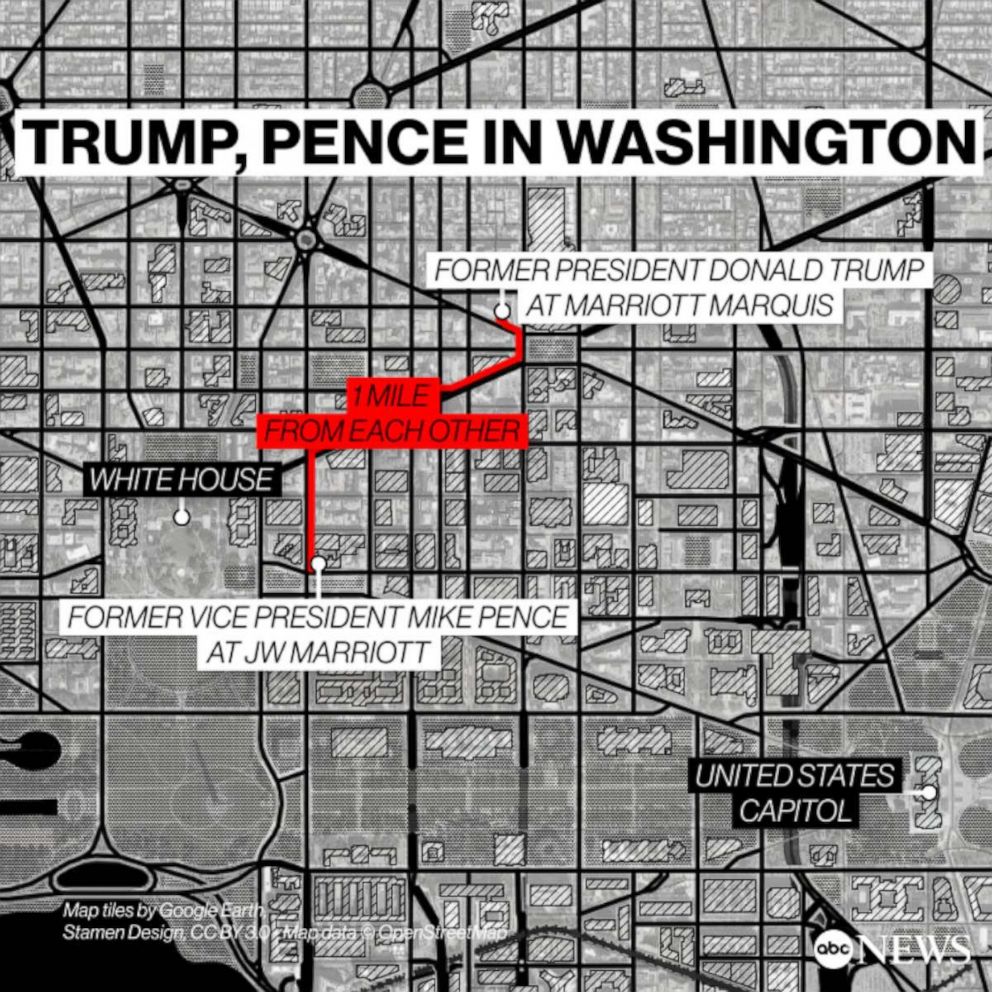
To that end, Pence attempted to take the attention of the GOP earlier Tuesday, touting his "Freedom Agenda" before the Young America's Foundation's student conference.
"I believe we can unite this conservative movement," Pence told the warm crowd. "Some would like to focus on the past, but elections are about the future."
Asked by a student at the conference about the divide between him and Trump on their outlook for the future of conservatism, Pence said, "I don't know that our movement is that divided. I don't know that the president and I differ on issues. But we may differ on focus."
Other prominent conservatives who were slated to speak at Trump's event Tuesday included House Minority Leader Kevin McCarthy of California, Minority Whip Steve Scalise, R-La.; Sen. Lindsey Graham, R-Ga.; Sen. Mike Lee, R-Utah; former White House aide Kellyanne Conway and GOP ally Newt Gingrich, all of whom have attacked the House Jan. 6 committee and its vice chair, Rep. Liz Cheney, R-Wyo.
With Cheney vowing the committee will hold more hearings in the fall, saying, "The dam has begun to break," at the last hearing in primetime where threats to Pence's life took centerstage, the panel also weighs whether to send a criminal referral to the Justice Department.
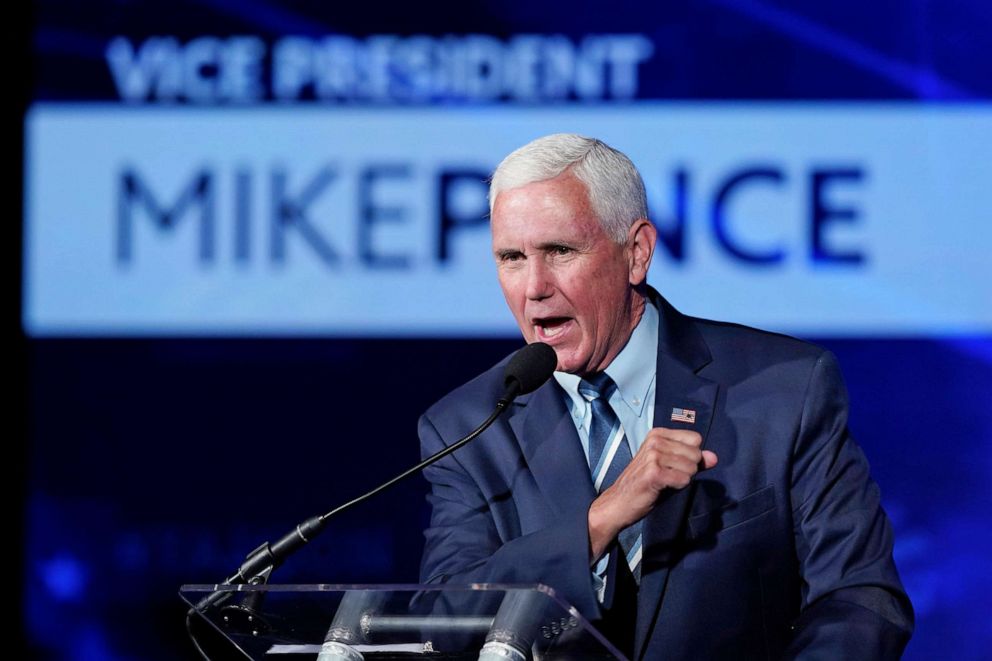
A referral is not required for federal authorities to charge Trump himself, nor will one guarantee such a move. But public hearings outlining Trump's "seven-point plan" to overturn the 2020 presidential election have amped up pressure on Attorney General Merrick Garland to bring a federal criminal case against Trump -- which would be the first in history against a former president.
Trump is already facing a civil investigation in New York, by state Attorney General Letitia James, into his family's real estate business practices; she has argued her office found "significant evidence" of fraud and Trump and some of his children are set to be deposed by investigators. (Trump has claimed James is politically motivated.)
Separately, Sen. Graham, only after a subpoena, will appear before a grand jury in Georgia as part of the Fulton County district attorney's ongoing investigation into efforts to overturn the 2020 presidential election results in the state.
The simultaneous probes show how Trump's legal problems continue to loom over a possible 2024 comeback bid.
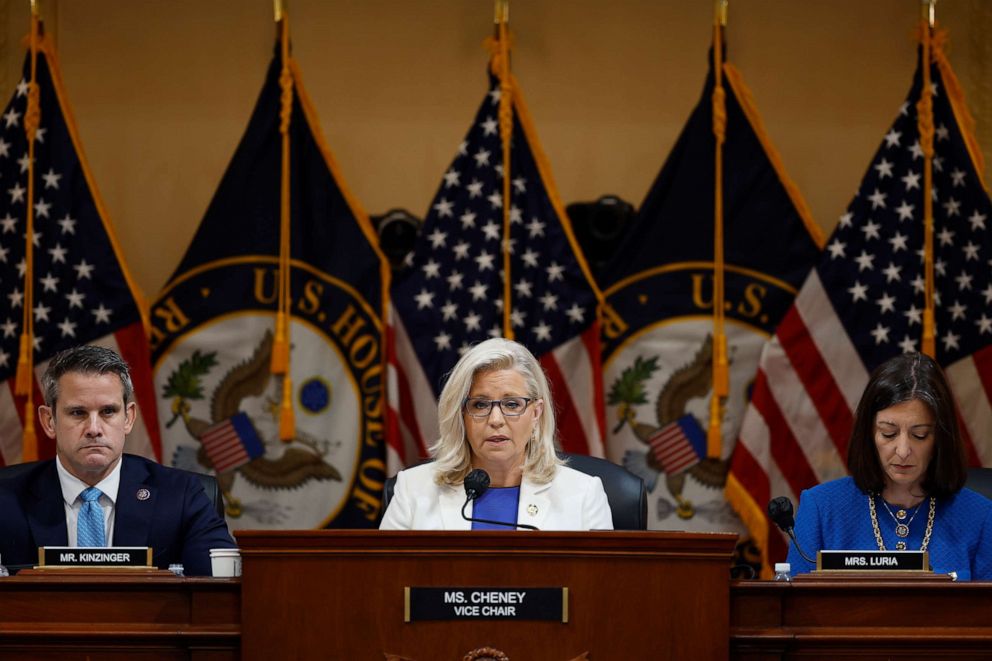
The only modern president who has refused to concede defeat, Trump was expected to lament his 2020 election loss in his address on Tuesday afternoon, though organizers had said in a release that his speech would be focused on "America First" policy.
Pence and Trump's split appearances on Tuesday further highlighted their estrangement-turned-rivalry, as both have thrown their support behind competing candidates in state primary races. In Arizona last week, Pence joined a term-limited Gov. Doug Ducey to rally for Karrin Taylor Robson, widely seen as the establishment GOP candidate in the open race for Ducey's seat; while Trump campaigned for Kari Lake, a former TV reporter-turned-"Ultra MAGA mom."
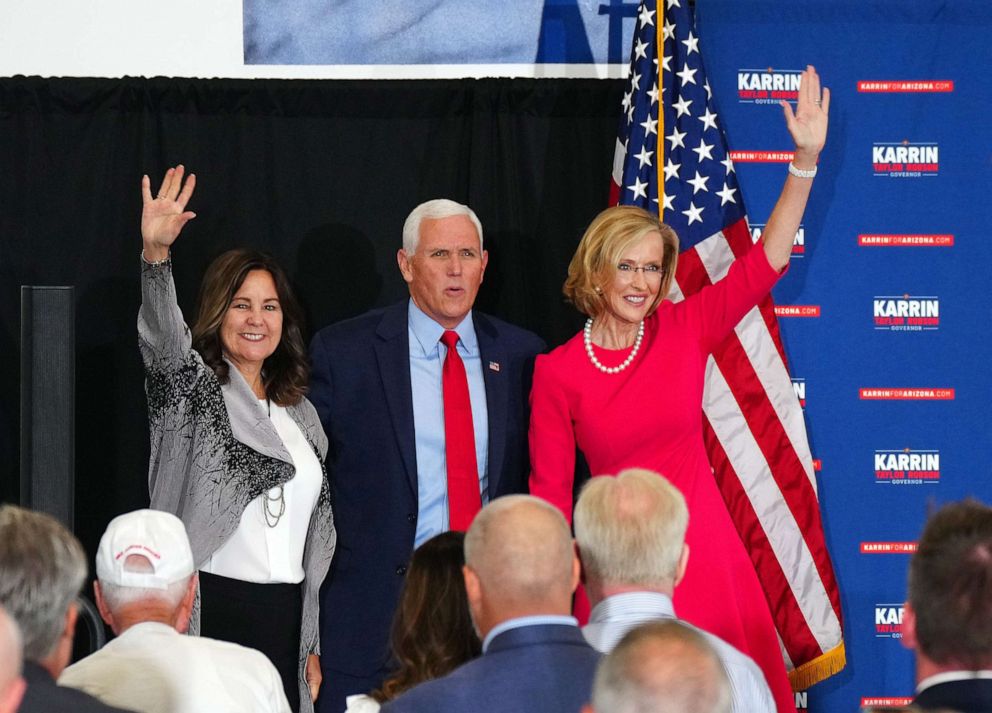
In May, Pence and Trump stumped for opposing candidates in the GOP primary to be Georgia's governor, with the Pence-backed incumbent, Brian Kemp, soaring to victory over Trump's pick, former Sen. David Perdue.
Last week in Maryland, Trump's pick, state Del. Dan Cox -- who criticized (and then apologized for criticizing) Pence as a "traitor" after Pence didn't reject the 2020 results -- won the GOP governor's primary, to the ire of term-limited Republican Gov. Larry Hogan, who backed a more moderate candidate and appears to have presidential aspirations himself.
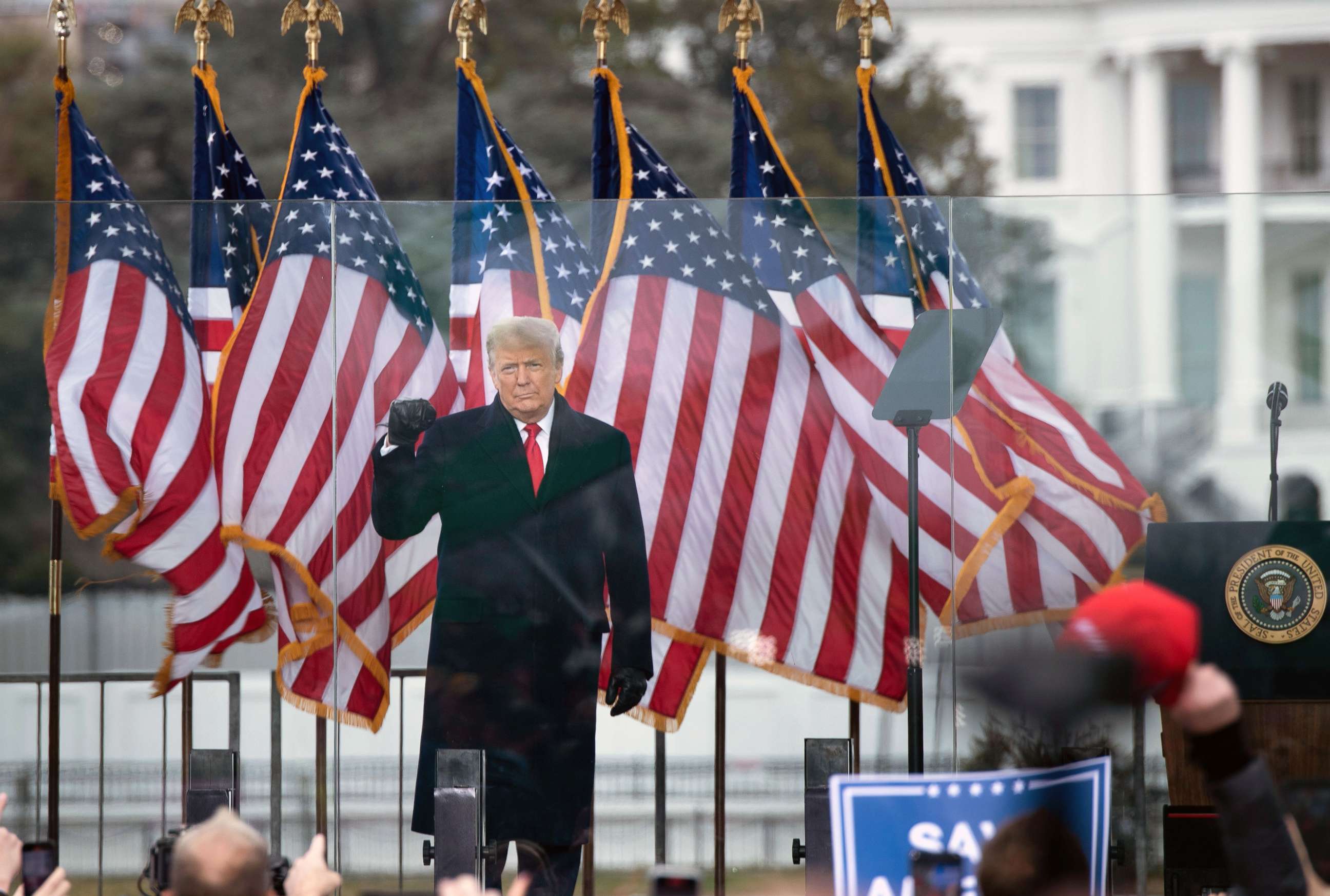
Hogan told ABC "This Week" co-anchor Jonathan Karl on Sunday that some in the Republican Governors Association were concerned about Trump potentially launching a 2024 presidential bid before November's midterm races, which Hogan said could upend contests across the country.
"I think most people are very concerned about the damage it does to the party if he announces now," he said. "And it may help in very red states or very red districts. But in competitive places and purple battlefields, it's going to cost us seats if he were to do that."
ABC News' Adam Carlson and Brittany Shepherd contributed to this report.




